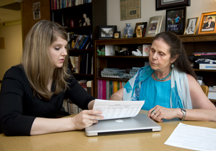Study: When dads play favorites; the kids know
July 8, 2013
 |
|
Research by Megan Gilligan, a Purdue doctoral student in sociology, and Jill Suitor, a professor of sociology, found that sibling Baby Boomers are likely to be more bothered by their fathers' favoring one over another than by their mothers' doing so. (Purdue University photo/Mark Simons) |
WEST LAFAYETTE, Ind. — Sibling Baby Boomers are likely to be more bothered by their fathers' favoring one over another than by their mothers' doing so, reports a new Purdue University study.
"It didn't matter who fathers favored. When favoritism was perceived there was tension among siblings, especially daughters," said Megan Gilligan, a Purdue doctoral student in sociology who is lead author on the article. "Often the role of fathers is overlooked in these older relationships, but what we found shows dads do matter."
This research, which is published in the July issue of the Journal of Gerontology, Series B: Psychological Sciences and Social Sciences, looked at 137 later-life families with both parents still alive when the data was collected in 2008. The average age of the 341 siblings was 49, and they were asked about tension among each other and the perceived favoritism by their parents. The parents were in their 70s and 80s, and the fathers were an average of three years older than the mothers.
"The importance of fathers' favoritism may come from these older adults noticing many of their friends' fathers no longer living, so they may value their dads even more than before; they realize their time together is limited," said Jill Suitor, a professor of sociology and article co-author.
Previous research by Suitor, Gilligan and Karl Pillemer, professor of human development in the College of Human Ecology at Cornell University, showed that if mothers favored a child, it caused sibling tension. However, that work focused only on mothers' favoritism. By looking at both living parents in this recent article, the researchers were able to evaluate the consequences of favoritism from both parents.
This research is based on the survey data from the Within-Family Difference Study, led by Suitor and Pillemer to evaluate the role favoritism plays in adult family relationships. The data for the 13-year project were collected in the Boston metropolitan area. The project is funded by the National Institute on Aging.
"The implications of these findings will be important to practitioners," Pillemer said. "We often think of the family as a single unit, and this reminds us that individual parent and child relationships differ and each family is very complex. Favoritism from the father could mean something different than favoritism from the mother. We suggest that clinicians who work with families on later-life issues be aware of this complexity and look for such types of individual relationships as they advise families on care giving, legal and financial issues."
The difference in this research could be the result of the role fathers played in this older generation.
"Fathers are important figures in families, and the father-child relationship is sometimes more tenuous than the mother-child tie," Suitor said. "Mothers are often more open and affectionate with their children, whereas fathers have sometimes been found to be more critical, leading offspring to be more concerned when fathers favor some children over others."
This also could play a role in why daughters experience more tension with their siblings when fathers favor them.
"The gender difference may occur because fathers, as other studies have shown, often invest more in their sons, thus, the favoritism shown toward daughters may violate these norms and result in greater sibling tension," Gilligan said. "For these reasons, when adult children perceive their fathers as engaging in favoritism, there may be greater concern about competition for his affection and support, resulting in higher levels of sibling tension."
Gilligan and Suitor also said that these values and norms may have changed since the Baby Boomer generation. Suitor, Pillemer and Gilligan plan to extend the present project to include interviewing the Baby Boomers about their own adult children.
Suitor and Gilligan are members of the Center on Aging and the Life Course. Gilligan will graduate in August and will begin as an assistant professor of human development and family studies at Iowa State University. Pillemer is the director of the Cornell University Institute for Translational Research on Aging at Cornell University. Seoyoun Kim, a Purdue graduate student in sociology and a member of the Center on Aging and the Life Course, also is a co-author.
Media contact: Amy Patterson Neubert, Purdue News Service, 765-494-9723, apatterson@purdue.edu
Related website:
College of Liberal Arts
Note to Journalists: Journalists interested in a copy of the journal article can contact Amy Patterson Neubert, Purdue News Service, 765-494-9723, apatterson@purdue.edu
ABSTRACT
Differential Effects of Perceptions of Mothers' and Fathers' Favoritism on Sibling Tension in Adulthood
Megan Gilligan, J. Jill Suitor, Seoyoun Kim, and Karl Pillemer
Objectives. We examine the differential effects of perceived maternal and paternal favoritism in adulthood on sibling tensions in adulthood.
Method. Data used in the analysis were collected from 341 adult children nested within 137 later-life families as part of the Within-Family Differences Study.
Results. Adult children's perceptions that their fathers currently favored any offspring in the family predicted reports of tension with their siblings, whereas perceptions of mothers' favoritism did not. Fathers' favoritism was a stronger predictor of daughters' than sons' reports of sibling tension.
Discussion. These findings contribute to a growing body of research demonstrating the consequences of parental favoritism in adulthood. Equally important, they demonstrate that perceptions of fathers' current favoritism plays an even greater role in shaping their adult children's sibling relations than do mothers' favoritism.

